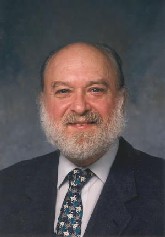 |
Thematic Program on the Renormalization
and Universality in Mathematics and Mathematical Physics
Clay Mathematics Institute Public Lecture
Leo P. Kadanoff, University of Chicago
"Making a Splash; Breaking a Neck:
The Development of Complexity in Physical Systems"
October 24, 2005 -- 6:00 p.m.
University of Toronto, Koffler Institute
Room KP 108
|
 |
Making a Splash; Breaking a Neck: The Development of Complexity
in Physical Systems
The fundamental laws of physics are very simple. They can be written
on the top half of an ordinary piece of paper. The world about us
is very complex. Whole libraries hardly serve to describe it. Beyond
this, any living organism exhibits a degree of complexity quite
beyond the capacity of our libraries. This complexity has led some
thinkers to suggest that living things are not the outcome of physical
law but instead the creation of a (super)-intelligent design.
In this talk, we examine the development of complexity using examples
drawn from studies of the flow of simple materials. Examples include
splashing water, the formation of a thin neck as one mass of fluid
separates into two, swirls in gases heated over a flame, and jets
thrown up from beds of sand. We watch complexity develop in front
of our eyes. Mostly, we are able to understand and explain what
we are seeing. We do our work by following a succession of very
specific situations. In following these specific problems, we soon
get to broader issues: predictability and chaos, mechanisms for
the generation of complexity and of simple laws, and finally the
question of whether there is a natural tendency toward the formation
of complex 'machines'.
|
 |
|
Clay Public Lectures
The aim of this lecture series is to increase the awareness and
understanding of mathematics — in the public at large as
well as in the business, scientific and university communities.
Leo P. Kadanoff is a theoretical physicist and applied
mathematician who has contributed widely to research in the properties
of matter, the development of urban areas, statistical models
of physical systems, and the development of chaos in simple mechanical
and fluid systems.
His best-known contribution was in the development of the concepts
of "scale invariance" and "universality" as
they are applied to phase transitions. More recently, he has been
involved in the understanding of singularities in fluid flow.
|
back to top
|
 |